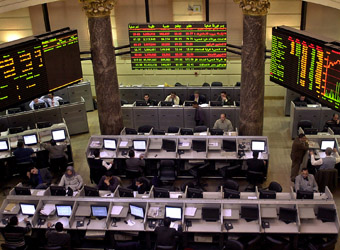The Egyptian Exchange (EGX) has ended this week posting losses of EGP 489 million driven by foreign selling pressures. The capital market has reached to EGP 386.441 billion during Thursday’s closing.
The EGX indices ended this week mixed.
Egypt’s benchmark index EGX 30 ended Thursday on a red note for the second day in a row under the approval of 100% sale of the stake of one of its biggest listed company in the market Orascom Construction Industries – OCI (OCIC.CA) to the Dutch Unit OCI N.V.
EGX30 dipped by 0.28% to end at 5715.87 p; while EGX20 dropped by 0.26% to close 6665.46 p.
Meanwhile, the mid- and small-cap index, the EGX70 rose by 0.36% to conclude at 489.39 pts. Price index EGX100 inched up by 0.14% to finish at 823.79 p.
During Thursday’s closing, the trading volume hit 72.936 million securities worth EGP 278.250 million, exchanged 17.386 thousand transactions.
This was after trading in 175 listed securities; 82 declined, 62 advanced; while 31 keeping their previous levels.
Foreign selling pressures drove EGX’s closing losses as Arabs and the non-Arab foreigners were net sellers seizing 1.15% and 5.62% respectively, of the total markets, with a net equity of EGP 1.118 million and EGP 10.440 million excluding the deals.
Meanwhile, Egyptians were net buyers seizing 93.23% of the total markets, with a net equity of EGP 11.559 million excluding the deals.
For the leading shares, Orascom Construction Industries – OCI (OCIC.CA)’s stock tumbled by 0.50% to close at EGP 266.51.
The firm announced the results of its Ordinary and Extraordinary General Meetings were convened on Wednesday Feb 13th, 2013. Shareholders approved with 99.99% voting favorably the offer submitted by the Dutch Unit OCI N.V. to seize 100% of the company’s local shares listed in the Egyptian Exchange (EGX) after previously controlling the OCI’s GDRs.
Blue Chips
In the short term, OCI NV’s offer could actually support prices of other stocks in Cairo, some analysts believe. That is because local investors, deprived of the opportunity to put money into Orascom Construction, may turn to other members of the handful of large, liquid blue chips, such as Commercial International Bank, Orascom Telecom and Telecom Egypt.
Anticipation of this may have helped to support the blue chips’ prices over the past several weeks. Telecom Egypt, for example, is up 4 percent since the end of last year, despite a string of negative economic news since then, including a sharp drop in Egypt’s currency reserves.
In the longer term, however, money seeking exposure to Egypt may simply go into OCI NV’s U.S. dollar-denominated shares in Amsterdam, rather than taking a currency risk and investing in the Egyptian stock market. That could have a chilling effect on the market.
The loss of Orascom Construction’s capitalization could also hurt foreign fund flows into the Egyptian market by reducing its weight in the Morgan Stanley Capital International (MSCI) indexes used by many international fund managers.
Other Egyptian stocks that analysts believe might be delisted eventually are National Societe Generale Bank, Orascom Telecom and EFG-Hermes, which have been targets of acquisitions by foreign firms looking to pick up cheap Egyptian assets.
“Egypt could be dropped from the MSCI index if we don’t see some rapid IPOs” to boost its capitalization, said Mohabeldeen Agena, head of technical analysis at Cairo’s Beltone Financial.
But until the economy strengthens considerably, there seems little prospect of initial public offers to create new blue chips. Real estate developer Amer Group Holding was the last IPO in Egypt, raising 1.15 billion Egyptian pounds with an offer in November 2010.
“Unfortunately, there are no IPOs coming up. One part of the market’s interest will vanish” with Orascom Construction, said Henin at The National Investor.


